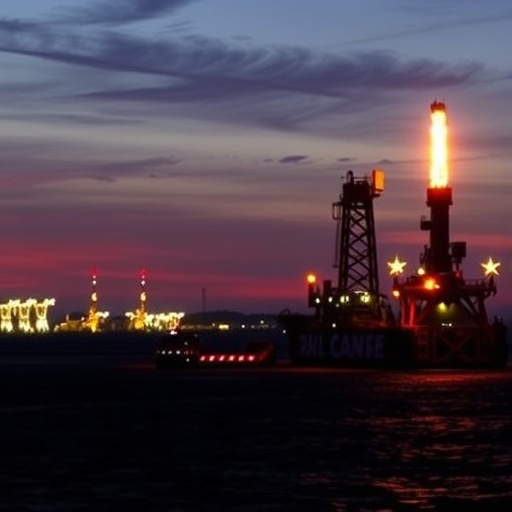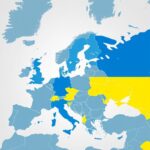Allied Nations Pledge to Eradicate Russian oil and Gas from Global Markets in Bold Anti-Putin Move
In a seismic shift for global energy dynamics, UK Prime Minister Keir Starmer has spearheaded a coalition of allies vowing to completely remove Russian oil and gas from international markets. This dramatic announcement, made during a high-stakes virtual summit, calls on nations worldwide to intensify sanctions against Russia, mirroring U.S. efforts and reinforcing unwavering military aid to Ukraine. As the world grapples with the ongoing invasion’s fallout, Starmer’s pledge signals a united front aimed at crippling Moscow’s war machine by targeting its most vital economic lifeline.
- Starmer’s Summit Revelation: A Turning Point Against Russian Energy Dominance
- Dissecting the Coalition’s Arsenal: New Sanctions and Trade Barriers Unveiled
- Ukraine’s Frontline Boost: Military Aid Commitments Solidify Allied Resolve
- Energy Market Turbulence: How Booting Russian Oil Reshapes Global Prices
- Global Calls Intensify: Urging Widespread Adoption of Anti-Russian Measures
The declaration comes at a critical juncture, with Russian oil still flowing into markets despite previous restrictions, fueling a conflict that has already claimed countless lives and disrupted global supply chains. Starmer emphasized that this coalition isn’t just about punishment—it’s about protecting democratic values and ensuring energy security for future generations. “We cannot allow Putin’s aggression to be bankrolled by the very resources that power our economies,” Starmer stated firmly, his words echoing through diplomatic channels and financial hubs alike.
Details of the plan reveal a multi-pronged approach, including tighter enforcement of existing sanctions, new trade barriers, and incentives for alternative energy sources. With Ukraine‘s resilience hanging in the balance, this move underscores the allies‘ commitment to not just defending Kyiv but reshaping the geopolitical landscape.
Starmer’s Summit Revelation: A Turning Point Against Russian Energy Dominance
Prime Minister Keir Starmer took center stage at the G7-aligned virtual summit on energy security, where he unveiled the coalition’s ambitious blueprint. Held amid rising tensions in Eastern Europe, the gathering included leaders from the European Union, Canada, Japan, and Australia, all united in their resolve to isolate Russia’s energy sector. Starmer’s opening remarks were unflinching: “The time for half-measures is over. We must excise Russian oil and gas from the global bloodstream to starve the aggressor’s ambitions.”
This isn’t mere rhetoric. The coalition agreement outlines immediate steps, such as expanding the EU’s ban on Russian oil imports—already in place since 2022 but with loopholes that allowed seaborne shipments to persist. According to recent data from the International Energy Agency (IEA), Russia exported over 7.5 million barrels of crude oil per day in 2023, much of it rerouted through shadow fleets to evade Western sanctions. Starmer’s plan targets these evasion tactics by proposing international monitoring of shipping and financial transactions linked to Russian energy.
Historical context adds weight to the announcement. Since Russia’s full-scale invasion of Ukraine in February 2022, allies have imposed waves of sanctions, freezing $300 billion in Russian central bank assets and capping oil prices at $60 per barrel. Yet, revenues from Russian oil have still topped $180 billion in the past year, per estimates from the Kyiv School of Economics. Starmer highlighted this irony, noting that every dollar earned funds tanks and missiles raining down on Ukrainian cities. The summit’s joint communiqué pledges $50 billion in additional sanctions-enforcement funding, drawn from seized Russian assets, to plug these gaps.
Experts praise the initiative’s boldness. Dr. Elena Petrova, an energy policy analyst at the Brookings Institution, remarked, “Keir Starmer‘s leadership here is pivotal. By coordinating allies, this could finally tip the scales, reducing Russia’s energy export revenues by up to 40% within the next fiscal year.” Her assessment aligns with IEA projections, which warn that without such unified action, global dependence on Russian oil could prolong the conflict indefinitely.
Dissecting the Coalition’s Arsenal: New Sanctions and Trade Barriers Unveiled
The heart of the coalition’s strategy lies in a robust framework of enhanced sanctions designed to dismantle Russia’s energy export machinery. Building on U.S. precedents, which have already sanctioned over 1,200 Russian entities since 2022, the new measures include secondary sanctions on third-party countries facilitating Russian oil trade. India and China, major buyers, face diplomatic pressure to align or risk their own access to Western markets.
Specific actions outlined in the agreement are multifaceted. First, a global price cap on Russian oil will be enforced more stringently, with naval patrols in key chokepoints like the Baltic Sea and Black Sea to intercept non-compliant vessels. The UK, leveraging its maritime expertise, commits to leading these operations alongside NATO partners. Second, financial sanctions will target banks in neutral nations that process payments for Russian gas, potentially freezing billions in transactions. The European Central Bank estimates this could sever 25% of Russia’s remaining gas exports to Europe, which have dwindled from 155 billion cubic meters pre-war to under 40 billion today.
Statistics underscore the urgency. Russia’s energy sector accounts for 40% of its federal budget, with Russian oil alone generating $100 billion annually. By contrast, Ukraine has seen its economy shrink by 30% due to the war, per World Bank figures, making allied support indispensable. The coalition also pledges $10 billion for Ukraine‘s reconstruction of its energy infrastructure, which has been battered by Russian strikes—over 50% of its power generation capacity destroyed since 2022.
Quotes from fellow leaders amplify the message. Canadian Prime Minister Justin Trudeau echoed Starmer, saying, “Our allies stand shoulder-to-shoulder; no more business as usual with those who wage war on innocents.” Meanwhile, EU Commission President Ursula von der Leyen detailed plans for a “REPowerEU” expansion, accelerating the shift to renewables to offset lost Russian oil and gas. This includes subsidies for LNG terminals and green hydrogen projects, aiming to boost Europe’s energy independence by 2030.
- Key Sanction Targets: Shadow tanker fleets (over 600 vessels identified), insurance providers for Russian shipments, and tech firms supplying drilling equipment.
- Enforcement Mechanisms: AI-driven tracking of oil cargoes, joint task forces with Interpol, and annual compliance audits for coalition members.
- Incentives for Compliance: Trade deals with allies for nations that curb Russian imports, including preferential access to U.S. and Canadian energy supplies.
These elements form a comprehensive net, ensuring that sanctions evolve from symbolic gestures to tangible economic warfare.
Ukraine’s Frontline Boost: Military Aid Commitments Solidify Allied Resolve
Beyond energy isolation, the summit reaffirmed allies‘ dedication to Ukraine‘s defense, with Keir Starmer announcing a £3 billion increase in UK military support for 2024. This package includes advanced air defense systems, long-range missiles, and training for 30,000 Ukrainian troops—part of a broader NATO pledge totaling €50 billion from European allies alone.
The timing is poignant. As Russian forces intensify assaults on Kharkiv and Donetsk, Ukraine‘s President Volodymyr Zelenskyy joined the summit virtually, praising the coalition: “Every barrel of Russian oil denied is a step toward victory. Your sanctions and solidarity save lives.” Zelenskyy’s plea highlighted the human cost: over 500,000 casualties estimated by Ukrainian officials, with civilian infrastructure in ruins.
Military aid specifics are telling. The UK will supply Storm Shadow missiles, proven effective in strikes against Russian logistics, while the U.S. commits F-16 jets under its Ukraine Security Assistance Initiative. Statistics from the Stockholm International Peace Research Institute (SIPRI) show that Western aid has delivered 98% of Ukraine‘s modern weaponry, enabling it to hold 80% of its territory against a numerically superior foe.
Yet challenges persist. Delays in aid delivery have frustrated Kyiv, with only 60% of pledged equipment arriving on schedule. Starmer addressed this, vowing streamlined procurement and joint production facilities in Poland to fast-track supplies. This integration of economic sanctions with military backing creates a holistic strategy, pressuring Russia on multiple fronts.
Energy Market Turbulence: How Booting Russian Oil Reshapes Global Prices
The ripple effects of removing Russian oil and gas are already stirring volatility in energy markets. Brent crude prices spiked 5% following Starmer’s announcement, reaching $85 per barrel, as traders anticipate supply squeezes. Analysts at Goldman Sachs forecast a potential 10-15% hike in global oil prices short-term, though long-term diversification could stabilize costs.
For consumers, this means higher fuel bills—U.S. gasoline averages could rise to $4 per gallon, per AAA projections, while European households face 20% increases in heating costs. However, the coalition counters this with a $20 billion green transition fund, subsidizing electric vehicles and solar installations to mitigate inflation.
Broader implications touch trade balances. Russia’s pivot to Asian markets has seen Russian oil exports to China surge 25% year-over-year, but sanctions on shipping could disrupt this. OPEC+ responses, including Saudi Arabia ramping production, offer buffers, yet experts like those at the World Economic Forum warn of a “polycrisis” if coordination falters.
- Short-Term Impacts: Supply disruptions lead to price volatility; EU imports from Norway and Qatar to fill 30% gap.
- Medium-Term Shifts: Investment in U.S. shale and Brazilian offshore fields accelerates, potentially adding 2 million barrels daily by 2025.
- Long-Term Vision: Accelerated net-zero goals, with allies targeting 50% renewable energy by 2030.
In Ukraine, the economic boon is clearer: reduced Russian revenues could shorten the war by months, per RAND Corporation simulations, allowing reconstruction to begin sooner.
Global Calls Intensify: Urging Widespread Adoption of Anti-Russian Measures
Starmer’s clarion call extends beyond the core allies, urging G20 holdouts like Brazil and South Africa to join the sanctions fray. Diplomatic envoys will fan out to Brasília and Pretoria, offering development aid in exchange for energy boycotts. This outreach could sway 20% of remaining Russian oil trade, according to UN trade data.
Forward-looking, the coalition eyes a “post-Russia energy order,” investing in African and Latin American resources to diversify supplies. By 2025, IEA models suggest this could lower global dependence on any single exporter below 10%, enhancing resilience against future aggressions.
As implementation ramps up, quarterly reviews will track progress, with adjustments based on Ukraine‘s battlefield needs. Starmer concluded optimistically: “Together, our allies will not only defend freedom but forge a sustainable tomorrow.” The path ahead is arduous, but this unified stance marks a potential game-changer in the fight for global stability.








